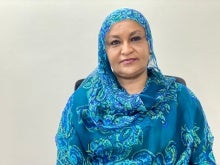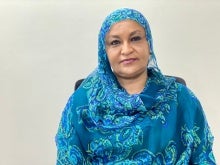Fighting between the Sudanese Armed Forces and the Rapid Support Forces has internally displaced 7.9 million people since 15 April 2023 and reversed many gains previously made towards democracy and stability. Women and girls have been uniquely hard-hit by the crisis and face a range of gender-specific challenges. After one year of conflict, more than 7,000 new mothers were at risk of death due to nutritional and health needs, and more than 6.7 million people were at risk of gender-based violence.
UN Women has worked with local women’s rights groups to support women and girls in Sudan and in exile since the conflict began. UN Women recently spoke with Shaza Ahmed, the Executive Director of Nada El Azhar, a Sudanese women-led organization providing assistance to survivors of gender-based violence, mental health support, and life-saving provisions as part of a famine prevention plan.
Ahmed recently briefed the UN’s Economic and Social Council on the situation in Sudan, and then spoke to UN Women about women’s place amid the conflict.
What is the situation of women and girls in Sudan?
Currently, women and girls in Sudan are facing gender-based violence, among other protection violations. They’re facing gender-based violence in their communities, in their journeys of displacement, and while seeking refuge in other countries.
Nada El Azhar works with hundreds of women and girls who are living with unwanted pregnancies and with sexually transmitted diseases. We are providing support to women and children who are traumatized and who have attempted to end their lives, due to the severe situation and displacement. Also, we are providing support to women on the move. Most of them are […] facing serious violations during their displacement journey.
At the same time, women and girls are facing tremendous risks because they lost their livelihood, their education, and their businesses. […]
Socially, women and adolescent girls are facing additional challenges as they move from their places of origin to unfamiliar places, from urban setups to rural areas, where the social life is completely different from what they were used to.
What should be done to help women and girls amid the conflict?
We need to recognize this crisis for what it is: it’s a protection and gender-based violence crisis. At least two actions are urgently needed:
- Strengthening protection and accountability measures, including a focus on the crime of conflict-related sexual violence; and
- We need to recognize the most vulnerable among us and establish a trust fund to support children born as a result of the conflict-related sexual violence.
I will call for a joint effort to address the needs of women and children and to put them at the centre of the humanitarian work in Sudan.
We need to address their different needs, different hard times, and different solutions. We’d like also to make sure that they are well consulted and well represented. For example, we need to have a focus on women and girls with disabilities, because their needs and concerns are completely different.
What are local groups and the international community doing to help Sudanese women and girls?
Although the international community is very dedicated to us—they support the protection response and the health and education needs—still there is a big gap when it comes to specific needs for women, especially women with disabilities.
UN Women is playing a very vital role in bringing together and amplifying the voices of women of Sudan. I’m participating on many platforms where UN Women is supporting the connection and communication—among women from different areas and diversities to come together to discuss their risks, their concerns, and to find solutions.
Working in the humanitarian field is always a process; we always need capacity building […] international expertise, and to make use of experiences from other countries and similar situations. But at the same time, we believe it’s very important to keep it as local as possible, and as international as necessary.
All that said, we feel that the local organizations, especially the women-led organizations, are heroes of the humanitarian work in Sudan.

